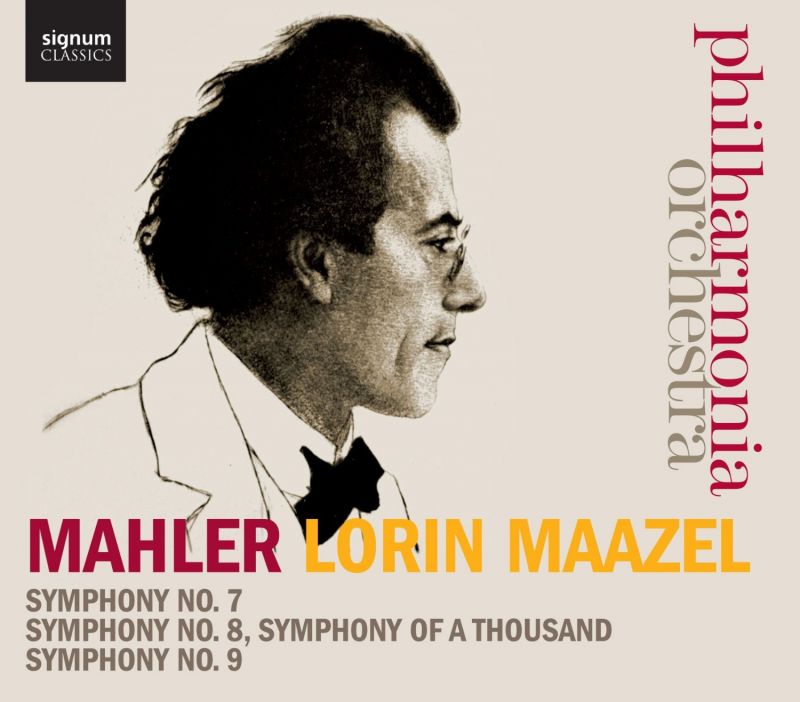MAHLER Symphonies Nos 7, 8 & 9
View record and artist detailsRecord and Artist Details
Composer or Director: Gustav Mahler, Lorin Maazel
Genre:
Orchestral
Label: Signum
Magazine Review Date: 09/2015
Media Format: CD or Download
Media Runtime: 282
Mastering:
DDD
Catalogue Number: SIGCD362

Tracks:
| Composition | Artist Credit |
|---|---|
| Symphony No. 7 |
Gustav Mahler, Composer
Gustav Mahler, Composer Lorin Maazel, Composer Philharmonia Orchestra |
| Symphony No. 8, 'Symphony of a Thousand' |
Gustav Mahler, Composer
Ailish Tynan, Soprano Anne-Marie Owens, Mezzo soprano BBC Symphony Chorus Eton College Boys' Choir Gustav Mahler, Composer Lorin Maazel, Composer Mark Stone, Baritone Philharmonia Chorus Philharmonia Orchestra Philharmonia Voices Sally Matthews, Soprano Sarah Connolly, Mezzo soprano Sarah Tynan, Soprano Stefan Vinke, Tenor Stephen Gadd, Bass |
| Symphony No. 9 |
Gustav Mahler, Composer
Gustav Mahler, Composer Lorin Maazel, Composer Philharmonia Orchestra |
Author: Rob Cowan
The 1984 Vienna Philharmonic Seventh (also on Sony, 6/86) was a highlight of Maazel’s previous Mahler cycle and although this 2011 remake is similarly sardonic and, at times, hedonistic (in the first movement’s sunnier moments), it too wants for spontaneity. The opening lurches forwards as if under duress – you can almost smell the sweat – the tempo painfully slow, and once into the Allegro con fuoco Mahler’s bold resolve has a job establishing itself. The expected sense of yearning a little later on arrives at a premium; and although the mood does eventually lighten, the sum effect is frankly glum. The first ‘Nachtmusik’ is rather better, with beautifully balanced sound (especially between brass, strings and timps) and an implied half-smile that suits the music, though the playing at 3'02" momentarily sounds confused. The Vienna strings are more yielding throughout (the violins especially) but Maazel chooses his tempi well and the effect is at least consistent. The verdant middle section, with its bird-like woodwinds, earthy climax and what I always think of as a Mahlerian ‘tango’ is especially good. Then again the mischievous Scherzo is oddly inhibited, quite deadpan in comparison with, say, Kubelík in Munich (either on DG or Audite) or Bernstein (Sony or DG). The second ‘Nachtmusik’ is, like its sibling at the near side of the Scherzo, restrained and gently playful; but when the ragbag finale thunders in, all comes right for a performance where weight of utterance at last seems called for, various musical side-glances make their effect and the closing bars are imposing. Not a great Seventh, and certainly no match for its VPO/Maazel predecessor, but pretty good, especially in the context of the rest of the Philharmonia cycle.
Maazel’s Vienna Eighth dates from 1986 and is in general to be preferred to this worthy newcomer. Here the best singers are the sopranos Sally Matthews and Ailish Tynan, while tenor Stefan Vinke, although sounding fully engaged, tends to strain. The opening of ‘Veni, Creator Spiritus’ packs a fair wallop but surely the ‘Imple superna gratia’ that follows is too slow. Temperature levels vary (try the somnambulant opening of ‘Accede lumen’, which does pick up in energy), and although the initial reprise of ‘Veni, Creator’ is exciting, it’s not enough to shift the critical balance away from Tennstedt live (LPO), Bernstein with the LSO (Sony), or Abbado in Berlin (DG). Part 2’s 12-minute orchestral opening is the performance’s high point – here Maazel fixes the atmosphere with some of his old magic – and baritone Mark Stone delivers his Pater Ecstaticus solo with much feeling. There are delicate moments and the closing ‘Alles Vergängliche’ is impressive. But moving, humbling, uplifting? Not really. Most of what we hear sounds like a dutiful night’s work (all these performances were recorded live at the Royal Festival Hall). The notes are securely in place but not their reason for being there. Tepid might seem like a cruel word to use, especially for a performance of this of all symphonies, but it’s not too far from the truth. At least there’s no applause to put up with.
So a bit of a disappointment, given that the previous two volumes of this cycle had so many good points. Vol 1 (3/14) is, I would say, the one to go for, but in other respects, thinking in terms of Nos 1 9, Kubelík, Haitink (Philips), Gielen (Hänssler), Abbado and Zinman (RCA) would be my first ports of call, with Bernstein (Sony) as an enticing supplement. This set is mainly valuable for those who attended the Southbank concerts. Maybe the more controversial performances came across more compellingly live than they do on disc.
Explore the world’s largest classical music catalogue on Apple Music Classical.
Included with an Apple Music subscription. Download now.

Gramophone Digital Club
- Digital Edition
- Digital Archive
- Reviews Database
- Events & Offers
From £9.20 / month
Subscribe
Gramophone Club
- Print Edition
- Digital Edition
- Digital Archive
- Reviews Database
- Events & Offers
From £11.45 / month
Subscribe
If you are a library, university or other organisation that would be interested in an institutional subscription to Gramophone please click here for further information.






